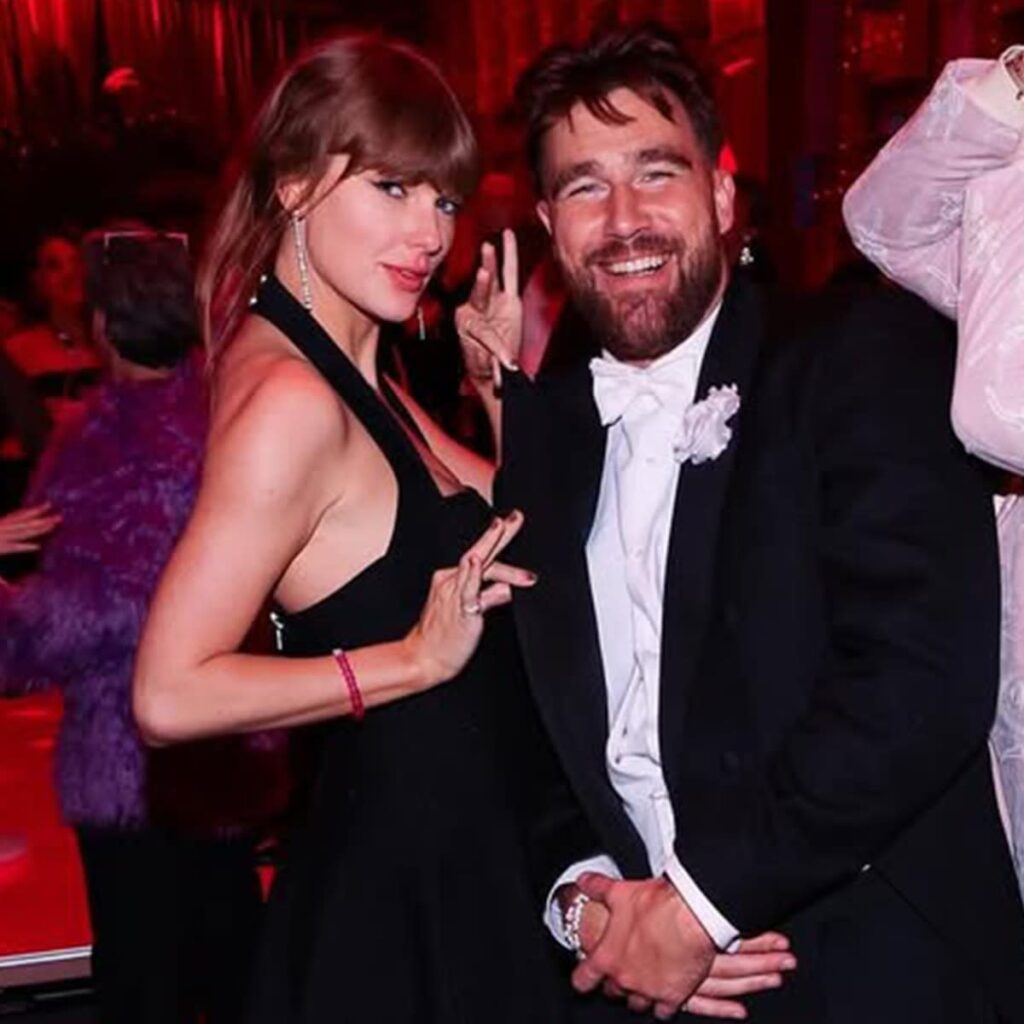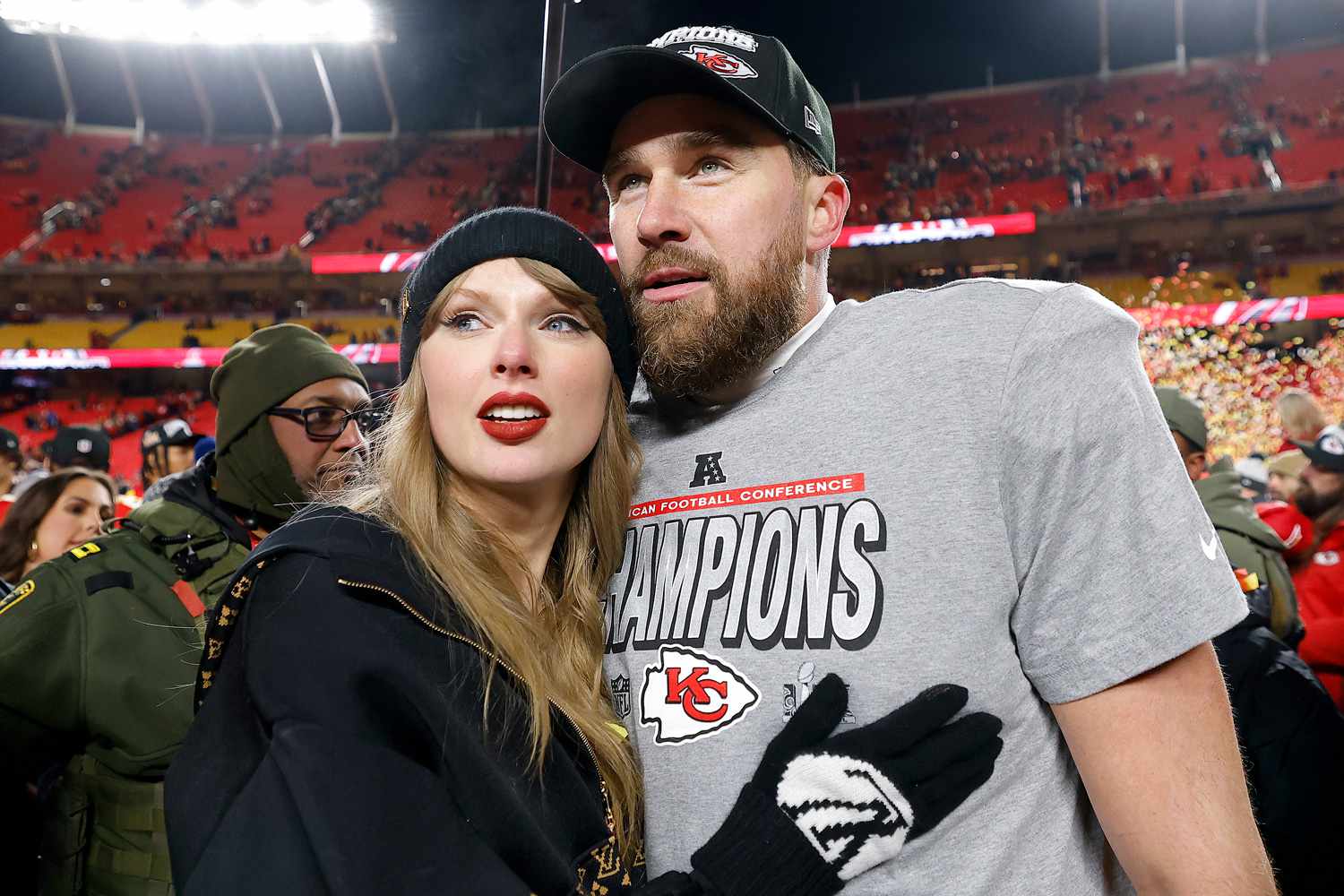On a lively episode of the New Heights podcast, Super Bowl champion Travis Kelce danced, sang, and clapped with joyful pride—not for a touchdown or a Chiefs victory, but for his girlfriend, global pop superstar Taylor Swift.
The Kansas City Chiefs tight end has never shied away from supporting Swift publicly, whether it’s attending her record-breaking Eras Tour shows or cheering her on at award ceremonies. But on June 4, 2025, during an interview with NBA legend Shaquille O’Neal, Kelce’s admiration reached new and deeply personal heights as the conversation turned to Swift’s latest triumph: reclaiming full ownership of the master recordings from her first six albums.
What followed was more than just banter between athletes. It was a candid, celebratory, and emotionally charged moment between three larger-than-life men united by their respect for an artist who spent over a decade fighting to control her own narrative—and finally won.
The New Heights podcast, hosted by brothers Travis and Jason Kelce, has become a cultural phenomenon in its own right. A blend of sports insight, comedy, and off-the-cuff charm, the show attracts major guests—and this week, Shaquille O’Neal was in the house.
Midway through the episode, the 7-foot-1 former basketball star suddenly interrupted the conversation.
“Hold on, don’t… I gotta show you guys somethin’,” Shaq said with a grin.
He pulled out his phone, pressed play, and held the speaker up to the mic. The unmistakable opening notes of Taylor Swift’s “I Knew You Were Trouble” filled the room—the original version from her 2012 album Red, not the re-recorded “Taylor’s Version.”
As Swift’s voice rang out, O’Neal mouthed the lyrics with theatrical gusto. Travis, caught in the moment, broke into an impromptu cha-cha. Jason bobbed his head back and forth, clearly enjoying the impromptu dance party. Then came the line: “You found me, you found me, you found me,” to which Travis responded with full jazz hands and a perfectly synced lip-sync.
Shaq paused the song. “That’s my favorite song in the world, brotha,” he said with no hint of irony.
Travis clapped exuberantly, his face lit up with pride. “Shout out to Tay Tay, just got that song back, too!”
Jason, hyped up by the moment, added, “Hell yeah!”
Then Travis got a little more serious, his voice reflecting genuine emotion. “Just bought all her music back so it’s finally hers, too, man. I appreciate that, dog.”
And just like that, three of the most macho names in sports delivered a heartfelt tribute to one of pop music’s most significant victories in artist ownership.
To understand why this moment meant so much—not just to Swift and her fans, but to Kelce and seemingly everyone in the room—you have to go back to 2019.
That year, Swift’s longtime record label, Big Machine Label Group, sold the rights to her master recordings to Scooter Braun’s company, Ithaca Holdings, in a deal reportedly worth $300 million. The sale included her first six albums: Taylor Swift, Fearless, Speak Now, Red, 1989, and Reputation.

The problem? Swift wasn’t part of the negotiations and learned about the sale the same way the public did: through the media.
The news ignited a firestorm. Swift accused Braun of years of “incessant, manipulative bullying” and said she had been denied the chance to buy back her masters. For many fans and industry insiders, the incident symbolized a broader issue in the music industry: how artists, particularly young women, are often cut out of deals involving their own work.
Rather than backing down, Swift took a revolutionary step. She announced plans to re-record all six albums under her own control, allowing her to reclaim the commercial value and creative ownership of her work.
One by one, she began releasing the re-recorded albums, each dubbed “Taylor’s Version,” to massive success. Fearless (Taylor’s Version) and Red (Taylor’s Version) debuted at No. 1. 1989 (Taylor’s Version) shattered streaming records. Fans rallied behind the project, not only out of loyalty but because they believed in the principle Swift was standing up for.
Then, in 2020, Braun sold the masters again—this time to Shamrock Capital. Swift was initially hopeful about working with them, but expressed disappointment that Braun would continue to profit from the deal.
Fast forward to May 30, 2025. Swift shocked the industry with a bombshell announcement: she had finally secured ownership of her entire catalog from Shamrock.
“I almost stopped thinking it could ever happen,” she wrote in an emotional letter posted to her website. “After 20 years of having the carrot dangled and then yanked away.”
“I am endlessly thankful,” she added. “My first tattoo might just be a huge shamrock in the middle of my forehead.”
The deal gives Swift ownership of not just the music itself, but also her music videos, concert films, and album artwork from that era—a rare, sweeping win in an industry that usually favors record labels over artists.
Travis Kelce’s public display of affection and admiration goes beyond mere boyfriend energy. His joy reflects a deeper understanding of what Swift’s victory represents—especially in an era where athletes and entertainers are increasingly vocal about owning their legacies.
While Kelce dominates on the football field, he’s also a businessman, producer, and media personality. He understands the importance of ownership in any career, especially when your work becomes part of pop culture history. Watching Swift reclaim her music catalog likely struck a chord with him—not just as a partner, but as a peer.
His reaction on the podcast—“Just bought all her music back so it’s finally hers, too, man. I appreciate that dog”—wasn’t just casual praise. It was the kind of deeply felt recognition that comes from someone who knows what it means to fight for your legacy.
In fact, Swift’s victory mirrors similar conversations in the world of professional sports. Athletes have long fought for rights to their own likenesses, highlights, and branding. In the age of NIL (Name, Image, Likeness) deals and athlete-founded production companies, ownership is more than a buzzword—it’s a necessity.

Beyond the personal victory, Swift’s acquisition of her masters is a cultural flashpoint.
Her story is now part of a broader shift in the entertainment industry toward empowering creators. What began as a deeply personal battle with a label exec has turned into a global conversation about who gets to profit from creativity. Swift has become a case study in what it means to stand up to the system—and win.
The fact that her moment of triumph was celebrated so enthusiastically by three iconic men in sports adds a unique twist. It breaks the mold of what these conversations usually look like and who’s having them. It’s no longer just about pop stars and record labels. It’s about everyone who creates, from the studio to the locker room.
Travis Kelce and Taylor Swift’s relationship has often played out in public view—cheeky Instagram likes, stadium PDA, and sideline shoutouts. But this moment on the podcast may be one of the most telling. It showed just how deeply Kelce respects not just Swift the woman, but Swift the professional.
When he danced to her song and shouted her out for reclaiming it, he wasn’t just celebrating a catchy tune. He was honoring the years she spent fighting to control her work, the countless legal meetings, re-recording sessions, and sleepless nights that led to a moment of true empowerment.
And it seems the feeling is mutual. In her original Instagram post announcing the acquisition, Swift called the milestone “one of the most profoundly meaningful moments of my life.” Not long after she posted it, Travis was among the first to like it. Patrick Mahomes, his teammate and close friend, retweeted the announcement.
Now that Swift owns her early catalog, the future looks even brighter. She can reissue deluxe editions, remix old hits, and even license her music for films and ads without having to ask permission—or share profits.
Meanwhile, Kelce continues to champion her success on the most unexpected stages. It’s a relationship built not just on fame or chemistry, but on mutual admiration and an understanding of what it takes to achieve greatness.
And in the background? The beat of “I Knew You Were Trouble” playing proudly on Shaquille O’Neal’s phone, soundtracking a moment that was so much bigger than music.
As Travis Kelce would say: “Shout out to Tay Tay. Just got that song back.”
And this time—for real—it’s hers.



